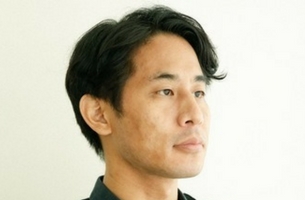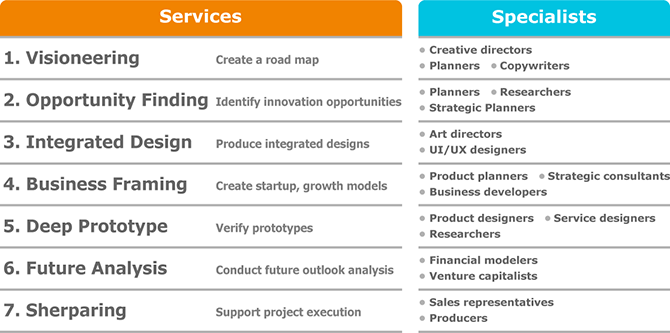
Dan Ushikubo on Why Business Designer Diversity Improves Performance

Dentsu Business Design Square was set up as a specialist unit at Dentsu’s head office in Japan. Its task is to help client companies develop a strategy that will allow them to attain a desired outcome through innovation.
In this series of articles, members of the specialist unit will explain what the term business design means at Dentsu.
In the third installment of the series, team member and business designer Dan Ushikubo discusses how bringing together a wide range of professionals at Dentsu Business Design Square is one of the unit’s strengths.
Talent, ambition lead the way
Dentsu Business Design Square benefits from the input of numerous professionals, each of whom brings to the unit the benefits of their background and special skills. A case in point is Tadahiko Sakamaki, who wrote Part II of this series.
In essence, our specialist unit comprises a group of talented, ambitious professionals. Some of us joined Dentsu after graduating from university, and subsequently developed particular skills at the company. A large number of others joined Dentsu midway through their careers. Taken together, these professionals are a good fit with the corporate culture, and facilitate an original approach to business design.
Those who joined Dentsu part way through their careers have worked in a variety of jobs. They range from product designers, editors, writers, and system integrators to members of trading companies, investment funds, and brokerage firms. As an editor and writer, I have experience in content development, as well as in product planning for a manufacturer, and have worked both as a strategic consultant and a freelance planner. It was after all this experience that I joined Dentsu.
Generating synergy through module development
Certainly an organization made up of people with diverse backgrounds may lack a common basis for dialogue, possibly leading employees to champion disparate approaches.
But those at Dentsu Business Design Square have a strong desire to communicate. That is because although each employee has their own specialty, as a unit we all seek to collectively take on the challenge of completing complex assignments that cut across specializations. The result is an organizational culture that facilitates the generation of synergy.
Methods for developing solutions through synergy tend to become tacit knowledge or one-time successes. To achieve more broadly applicable and lasting results, we have been allocating resources to universal modules and menus for arranging and sorting services. Since the tasks we tackle are complex, we have many discussions, which help us better understand each other.
Next, let’s consider the reasons for which Dentsu Business Design Square recruits its members and what attracts them to this specialist unit.
Solutions need more than logic and intuition
Since projects increasingly require people with diverse skills, highly specialised individuals have been chosen for our unit’s team. As tasks become more complex, blind spots and underlying prejudices often become apparent only from a fresh perspective.
Thus, designing a service requires individuals who work behind the scenes on a detailed operations plan, while those on the front line design a tailored user experience.
A quick look at the basic issues involved in projects typically taken on by our unit reveals a need for both strategic consulting and more than simple logic for the handling of core assignments. This is because tasks tend to be very complex in terms of structure and components. To my mind, one reason that Dentsu Business Design Square stands apart is that it is able to handle so many complex projects.

The above table indicates the types of specialists with the skills needed to provide each line of service offered by our specialist unit. For further details concerning our services, please refer to the first article in this series.
Default setting: both left and right sides of the brain
Recently, while strategic consulting companies have been acquiring design consulting firms and creative boutiques, collaboration among companies in the advertising industry has been growing. This is an indication of the increasing number of complex assignments. Mostly channelled through to management and planning operations, they are left brain activities.
This is in contrast with the integrated artistic sensibilities and scientifically driven logic that have been part of our business and corporate culture from the beginning. It can thus be said that Dentsu employees simultaneously use both the left and right sides of their brains.
Strategic planners, who use the left side of their brain for conducting marketing analysis, have long worked side by side with ad creators, who use the right side of their brains to create and produce designs. Our corporate culture is the result.
Thus, many clients who know our corporate culture and track record, turn to Dentsu when they face difficulties, such as when they don’t even know where to begin with a project. The resultant consultations are always surprising, even for experienced business planners.
As our unit is requested to handle an increasingly broad range of assignments, it seems likely that even more specialised staff will be recruited in the future.
Dan Ushikubo, Business Designer at Dentsu Business Design Square













